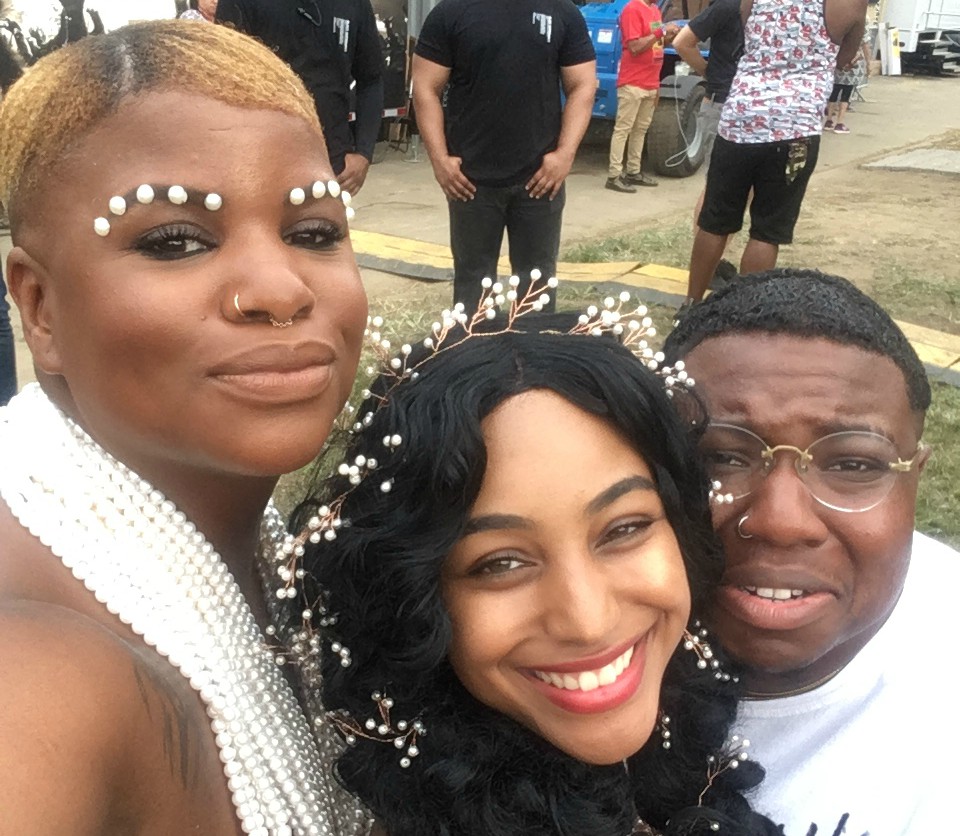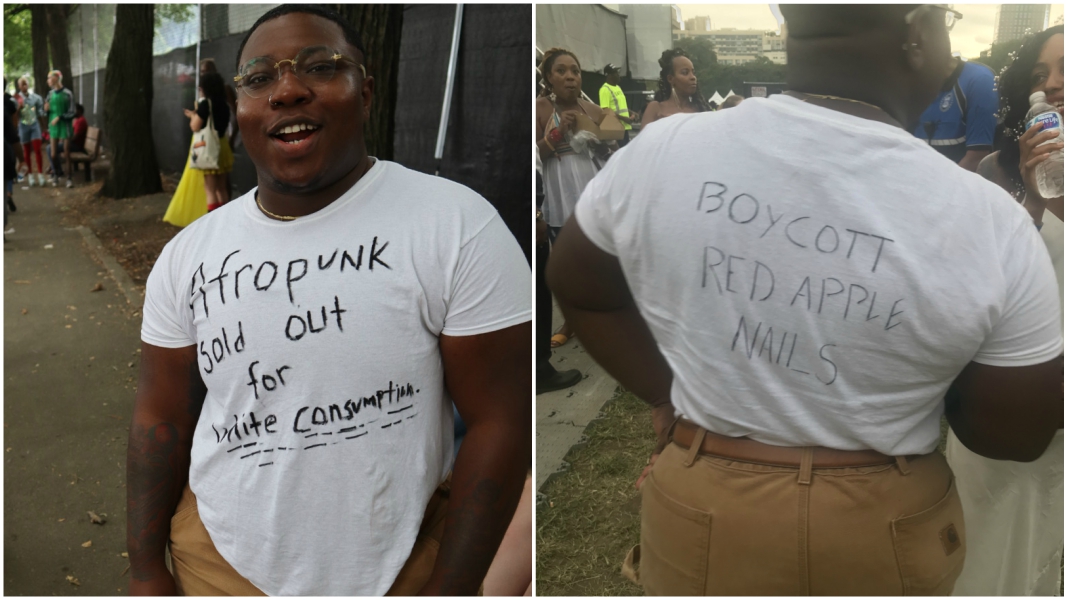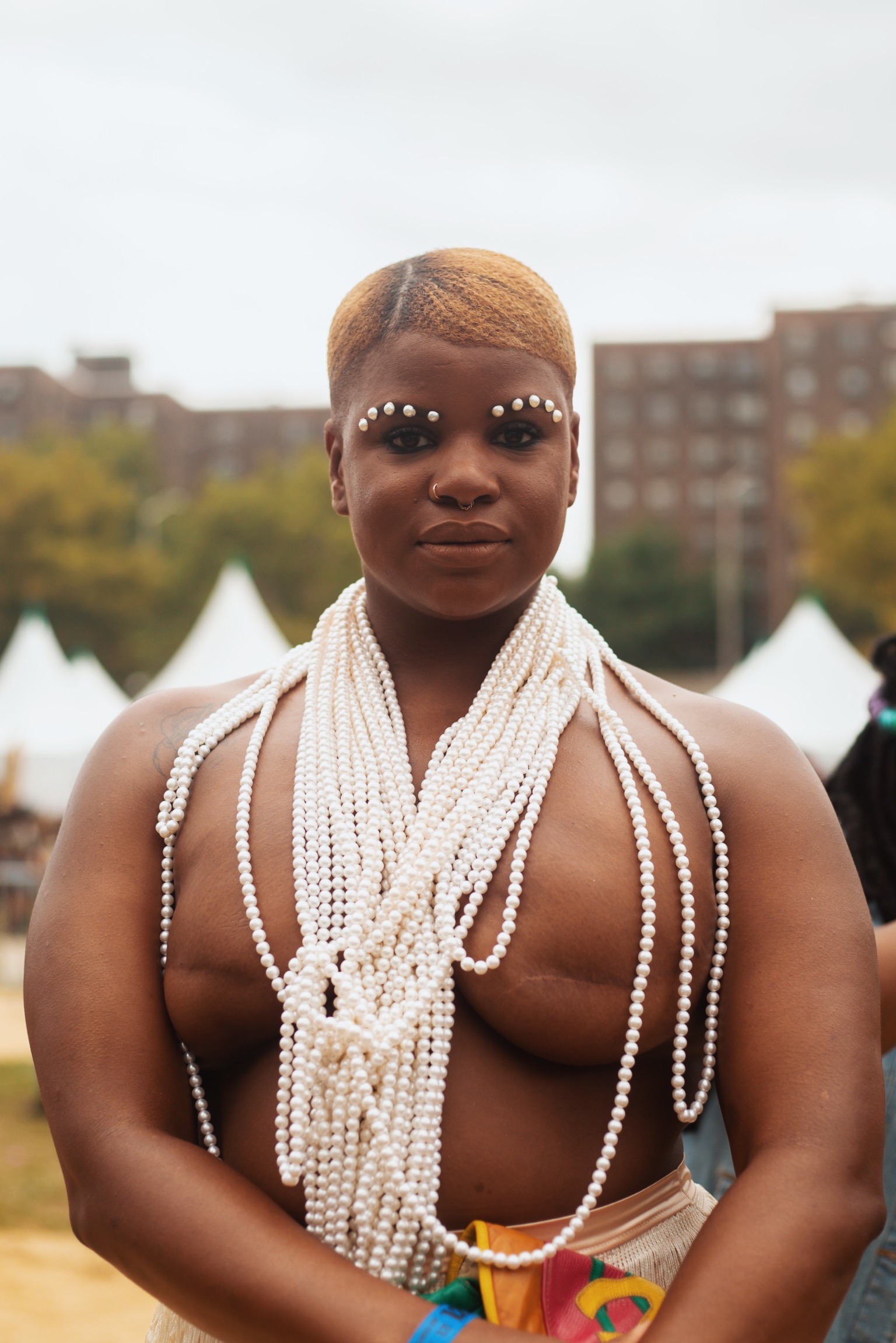
Photo used with permission from Ericka Hart (l-r: Ericka Hart, Lorelei Black and Ebony Donnley)
For years, Ericka Hart’s image has been used toward the marketing of Afropunk’s annual summer festival in Brooklyn, New York. Hart, a sex educator and racial justice advocate, has a look photographers are eager to capture and it speaks to the sense of liberation the event tries to promote.
As one of the more recognizable attendees, Afropunk asked Hart to give an interview about the event. After spending three hours at the festival in Commodore Barry Park, Hart, her partner Ebony Donnley and their friend Lorelei Black stepped into the VIP section where Hart’s interview was scheduled. After the interview, the three decided to hang out in the area for a few minutes to finish their drinks before leaving VIP.
As they were doing so, a feminine presenting person, as Ericka describes, walked briskly—almost ran up to her partner—looked at his shirt and asked, “Well why are you here then?’
Hart’s partner, Ebony Donnley, was wearing a shirt Hart had crafted that read:
“Afropunk sold out for white consumption.”

Photo used with permission from Ericka Hart
The back of Donnley’s shirt read: “Boycott Red Apple Nails” in reference to the Brooklyn nail salon where employees threw acetone on three Black people and hit them with broomsticks because a patron didn’t like her eyebrow wax and refused to pay for it.
After, the incident, Hart started feeling like they should probably leave the VIP area, but felt the occurrence wasn’t a big deal. She wanted to be in “community with the people of Afropunk [and] VIP is not the community of Afropunk.”
But before Hart and her crew could leave, Matthew Morgan, the co-founder of Afropunk, approached Hart’s partner.
“I turned my back and Matthew Morgan is in my partner’s face, waving his hands but I can’t hear what he’s saying. So I turned to my partner and I say, ‘What just happened?’”
Donnely said, “He just asked me ‘Why am I here?’ Matthew Morgan just pointed at my shirt and said ‘What’s this? Why are you here?’
Morgan asked the same question of their friend before going to a security guard.
While Black, Hart’s friend didn’t know Matthew Morgan was the co-founder of the event, Hart did. She and Donnely met Morgan at Afropunk Atlanta where he thanked Hart for “being a walking free advertisement for Afropunk.”
When Morgan came over to Hart, he said, “Hi Sweetheart…’ Hart said the ancestors blocked her from hearing the greeting because calling her sweetheart after he’d accosted her friend and partner wouldn’t have gone over well. Morgan told her, “Sweetheart, we’ve met before. This is my house, this is my house. They have to leave. They don’t need to be back here.’
Hart was confused. They were invited back there as guests and since she was doing a free interview for the Afropunk brand, she couldn’t understand why her guests were being asked to leave. Morgan told her it was his house once again before a security guard, who recognized Hart from the internet, came to escort the three out of VIP.
Hart, her partner and their friend walked around the festival for about an hour after being kicked out of VIP, sharing with people what had happened to them. She’s continued sharing in the days since the festival’s conclusion on Sunday, August 26.
“I think, overall, there’s an assumption that Black people are going to be lazy, uninformed consumers. That we’re just going to go to something, see that there’s a booth sponsored by Garnier Fructis and not know that that’s a predominately White brand that’s owned by L’Oréal. Or we’re going to go to an event and see that there’s no ASL (American Sign Language) interpretation and not say anything about it. I paid $67 to go. I have a right to actually contest with the ways in which this event is run and I can do it within the event.”
Hart shared that the T-shirt she created was just one of the ways people have expressed their grievances in regard to the changes or practices of Afropunk. Photographers have complained about their images being on Afropunk’s website without credit or compensation. Members of the hearing impaired community have shared their disappointment in the absence of ASL interpreters. There are also those who are upset that the event now has a cost when it used to be free.
In fact, when someone questioned the cost of the event on Twitter, Afropunk responded in a manner that some have deemed unprofessional.
The concerns expressed in the original tweet are the reasons why Hart created the shirt in the first place. “We essentially want to let Black people know that we see them, we hear the things that are being said.”
Hart said Morgan’s decision to kick Black people out of a space, considering how over-policed we are, was ridiculous.
“But the gag is I said everything that was on my partner’s shirt in the interview that I did.”
With the videographer, sound person and individual conducting the interview, there were four people who never asked her to leave the space. Hart has since asked that her interview not be used by the brand, not that Morgan would have allowed it to air anyway.
“This shirt caused all of this disruption and it just shows that it’s true,” Hart said.
In the moment when the group was being asked to leave, Hart said she was heartbroken and pissed off. “My partner is a Gemini and emotes so he cried afterwards, like literally crying in the park. So that pisses me off because it’s just not necessary for that to have gotten to that point. It’s abrasive and it’s violent to have security kick you out. You could have said ‘Hey, could you guys leave? We don’t appreciate that T-shirt back here.’”
Given Afropunk’s own messaging, the decision was “off-brand.”

Photos used with permission from Ericka Hart
“It’s not even like we’re tying to sniff that out. The hashtags are #resistance #speaktruthtopower #powertothepeople. Are you kidding me? One of the tenants is #NoBullying. You’re talking about you’re partnering with Random Acts of Flyness, which is a dope a** show that talks about the way in which we’re policed, but then you have police walking around the event. I counted at least 10 within the short hour that I was in the main park and I’ve never seen that. You see them on the outside but not on the inside of the park, in full uniform. That’s triggering as f*ck.”
Hart said she’s seen other signs that the event wasn’t as supportive of the community as it should have been.
“There’s a level of cognitive dissonance living in this country as a Black person and the things that we engage in anyway, even though we know about stuff. And it was definitely internalized anti-Blackness on my part that I heard from other Black people that Afropunk was mistreating them and I went anyway,” she said. “So there’s an intra-communal conversation about the things we still participate in even though people have been harmed. People have been harmed that look like us.”
Hart said after the interaction this year, she doesn’t plan on attending the event in the future.
“It just doesn’t feel good. It was just a culmination of people’s experiences and then it happening to me and it just made me feel disposable. I don’t want to support an event that doesn’t care about Black people, especially if they position themselves to act like they do. As an activist, that’s one of the most frustrating things in the world, when people perform activism. It diminishes people’s work. It causes more violence. People think activism is a hashtag and it’s not disrupting a space. It’s not going in and wearing essentially a picket sign T-shirt. [Activism] could be a hashtag but it really is disruption.”
In an ideal situation, Hart would have loved for Morgan to have a conversation with her and her partner about the words on the T-shirt instead of throwing them out.
“I would have loved if he had just come over and said, ‘What’s up? I want to talk about this. I’ve been hearing about this.’ Because you know damn well he has,” she said. “‘Let’s chat about it. How can I fix this? You’re a patron of my event. You came here and supported Afropunk anyway. So thank you for doing that. How can we make this better?’ That would have been ideal.”
You can learn more about Ericka and her work at IHartEricka.com









